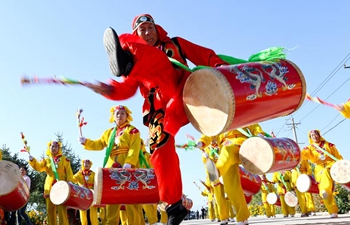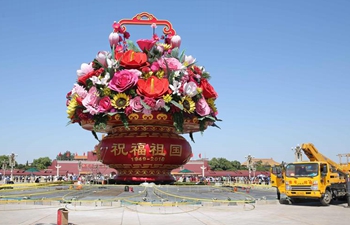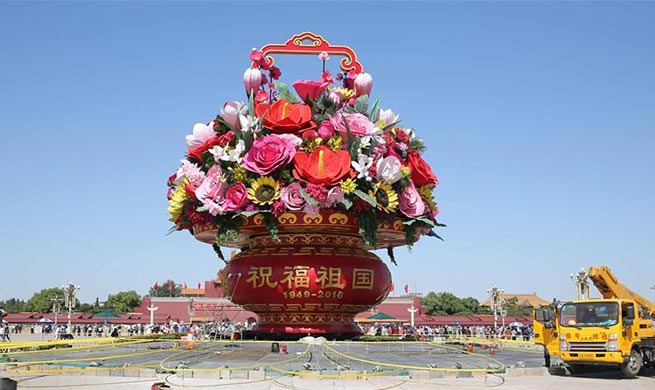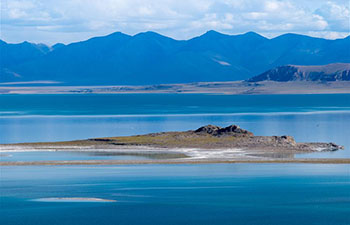by Jamal Hashim
BAGHDAD, Sept. 22 (Xinhua) -- Weeks of angry and violent protests in Iraq's southern province of Basra pushed the political blocs to agree on a political deal that could likely bring little changes to the country's political map.
The Iraqi political blocs have been in deep differences and tough negotiations for months over forming a new government, which so far, resulted in electing Parliament Speaker Mohammed al-Halbousi and two deputies in the past few days.
There is still long way ahead of electing a president of the country and finding a solution to the biggest challenge of the largest alliance that would form a new government for the next four years.
The political scene has been confused since a group of parliamentary blocs headed by Sairoon Coalition, backed by Shiite cleric Moqtada al-Sadr, and Prime Minister Haider al-Abadi's al-Nasr bloc, announced the largest alliance named Reform and Construction.
Other blocs led by Iranian-backed al-Fatih Coalition, paramilitary Hashd Shaabi leader Hadi al-Ameri, and former Prime Minister Nuri al-Maliki, also claimed the largest alliance named Building.
The political row over largest alliance is widely believed to be the reason that would delay the formation of a new government.
On the other hand, the Shiite religious authority headed by the spiritual Shiite cleric Ayatollah Ali al-Sistani called for formation of a new government that would be different from previous ones.
Najib al-Jubouri, a political analyst, told Xinhua that Basra protests and Sistani's comment forced Sadr to withdraw his support for Abadi, whose political al-Nasr Coalition came in third in May 12 vote.
"The motivation of Basra protests are strongly believed due to poor performance of previous governments, including Abadi's one," Jubouri said.
"Now the formation of largest alliance could change, as Sadr's Sairoon coalition is negotiating with Ameri's al-Fatih to discuss a consensus candidate for next prime minister post," Jubouri added.
"There is an initial agreement between al-Fatih and Sairoon that there have to be a consensus on the next prime minister in accordance with the conditions set by Marjiyah (or religious authority)," Ahmed al-Kinani, a lawmaker from al-Fatih political bloc, told to reporters Wednesday.
Such change in the course of the negotiations "explains why Abadi on Sept. 13 said that he would not hold onto the post of prime minister for a second term," Jubouri said.
"We do not cling to power, but we abide by the constitutional procedures," Abadi said at a press conference after a cabinet meeting, adding that the decision was made after what he has seen "from the political conflict over this post."
Abadi expressed his respect for "the directives of the Supreme Religious Marjiyah," the Shiite religious authority headed by the spiritual Shiite cleric Ayatollah Ali al-Sistani.
"Abadi's departure would be a victory for the Iranian influence in Iraq because he had vowed to abide by the U.S. sanctions against Iran," Jubouri said.
"However, as Iran does not have the ability to go into open conflict on power in Iraq with the Americans, it apparently made a concession in return by pushing its ally Ameri to withdraw candidacy for the premiership to avoid angering the Americans," Jubouri concluded.
"I announce to the Iraqi people that I withdraw my nomination for the Presidency of the Council of Ministers (Prime Minister) to opened the way for electing another prime minister of Iraq, according to conditions set by the Marjiyah (or religious authority)," said Ameri on Sept. 18, whose Fatih Coalition came in second with 48 seats in May 12 national elections.
Iraqi media circulated that Sadr and Ameri have suggested possible candidates for premiership, including Shiite politician Adel Abdul-Mahdi, who previously served as oil, finance minister and vice president.
However, Jubouri believes that Mahdi's political background and his performance in all of his previous posts were not convincing.
"He lacks outstanding record in his previous posts, and he had background of being a leading figure in the Islamic Supreme Council of Iraq, before splitting from the Iranian-backed Shiite party. Therefore, Mahdi hardly fits for being independent technocrat," Jubouri said.
Sadr repeatedly announced that he wants "independent and technocrats" government members, but his demand is facing objections by some politicians and leading political parties.
Sadr said that his rivals "want to take Iraq back to square one and bring back corrupt politicians in new garments." He warned that "if they continue then I will announce joining the opposition."
Sabah al-Sheikh, a political analyst, told Xinhua that a technocratic government may not be ready to implement essential changes to situations in Iraq without the presence of a real political will by leading political parties.
"A technocratic government would be insufficient and ineffective because any of its ministers may not have enough power to tackle corruption inside his ministry as he is nominated by the same parties and political blocs who are accused of graft," Sheikh said.
Many of the country's political parties have built their own militias and gained influence and power throughout years of spat across the country after 2003. None of them is willing to lose their gains.
"Under such fact, the state ministers became part of the parties' property and were working for their parties' interests instead of nationwide interests," Sheikh added.
"The only way to agree on a strategic plan to rebuild the country is to convince the leading political parties to agree on new approaches for the political process that would yield a government more powerful than the parties themselves," Sheikh concluded.

















